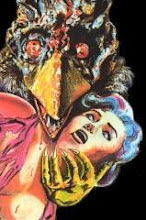THESE ARE MY FAVORITE THINGSSS!!
*Audience of middle-aged women screams
at the top of their lungs*
And so it goes. Well, I know I'm no Oprah, but that doesn't mean I can't rip her show off all the same. In the spirit of the departed Oprah show (and in the spirit of materialism and happy holidays) I thought it would be fun to blog about my favorite stuff. Now, as I said earlier I'm no media mogul, so there's no free shit here. If you're looking for complimentary cars, I can tell you that I have none. But what I do have are a very particular set of geeky interests, which make for entertaining (if not self-indulgent and fan-ish) blog fodder.
Okay, before I continue let's lay down some ground rules. First thing, being that this is a petite blog post there's no way I'm gonna fit everything I currently like on this thing. I'm not even going to try to make this a comprehensive list, so no tears if you notice that I missed something awesome/cool. Life's not fair. So with the limited scope of the list in mind, let me give you some further idea of how I've organized this list. I've picked two categories: movies and books. In each of the two categories I've picked three different things that I happen to like. Now, these three things are random- they may be something current or an old favorite or just something in between. Rest assured, if I mention something here then I think that it's pretty cool and it is given the Hedorah stamp of approval.
Now without further ado, let's get the party started. These are a few of my favorite things:
Movies:
In Bruges - I have loved this movie since I first viewed it in a Chicago theater with my friend
El Lobo back in 2008. Recently I decided to revisit it after combing through my DVD collection during a fit of boredom. And you know what? It's still awesome. Beautiful European scenery, unflinching violence, and an awesome cast of oddball characters are all selling points, but it's the darkly witty dialogue that really makes the movie for me (ex- "A lot of midgets tend to kill themselves. A disproportionate amount,
actually...not the R2-D2 man; no,
he's still going"). Not to sound like a snob, but a lot of modern mainstream comedy leaves me cold.
In Bruges was just dark, biting, and smart enough to break past my pretensions and make me laugh. And the fact that the movie still entertains on the fourth or fifth time 'round is a testament to how well-written this film is.
Outrage -
Outrage is a Japanese yakuza flick from 2010. I recently had the chance to see it in the theater and I thought it was a pretty solid picture.
Outrage tells the blood-soaked story of power struggles amongst members of modern Japan's criminal underbelly. It's a pure adrenaline rush of a movie as betrayals and power grabs among the yakuza lead to inventive and increasingly brutal moments of violence (the film's unconventional use of dental equipment is unforgettable). Couple these punchy moments of violence with some sharp black humor and you have a movie worth the price of admission.
Curse of the Golden Flower - I saw this movie in theaters way back when it first came out in '07, but I decided to revisit it recently after watching
Red Sorghum (the 1987 film that marked the directorial debut of Zhang Yimou as well as the acting debut of Gong Li) earlier this year. Despite some dated CG, I found that Golden Flower still thrills. The movie's story is Shakespearean in scope and it's fun to watch the characters' tortured relationships play out as their dark family secrets come to light. Plus, the elaborate costumes are spectacular and Gong Li is awesome as the Empress who tries in vain to defy her husband's rule. The action scenes here are pretty rock solid as well.
Books:
Retromania by Simon Reynolds - Reynolds is a music critic/commentator who noticed a trend of recycling and repackaging in modern pop music and decided to investigate. Reynolds spends 400+ pages mining the culture behind the recycling of old musical material and theorizing on why the nostalgia market for old musical acts/styles has grown so bloated in recent years. The author is prone to go off on tangents, but for those with an interest in pop culture these tangents will be just another enjoyable part of the ride that is
Retromania. While Reynolds is specifically interested in music, his book will appeal to anyone interested in pop culture creation and consumption in a broad sense. I found his chapter on Youtube to be particularly awesome.
The Sandman Vol. 1: Preludes and Nocturnes by Neil Gaiman - I loved the Sandman series in high school and recently went back and read the first few volumes. Guess what? They're still compelling pieces of storytelling. The Sandman series is so hyped that I feel like any praise I have to give is redundant at this point, so I'll just leave it at this: the series is awesome and you should read it if you have not yet done so.
Witchcraft Through the Ages by Jack Stevenson - a quick read that sheds light on an interesting though relatively obscure figure in film history - Benjamin Christensen, the director of the cult 1920's film
Haxan. While much of the book focuses on
Haxan, it also details Christensen's life and career before and after the making of his most famous film. Lovers of the obscure or the offbeat will delight in this slim, yet informative title. It also makes a great companion piece to a viewing of
Haxan.
 |
| Benjamin Christensen himself as Satan in Haxan! |













